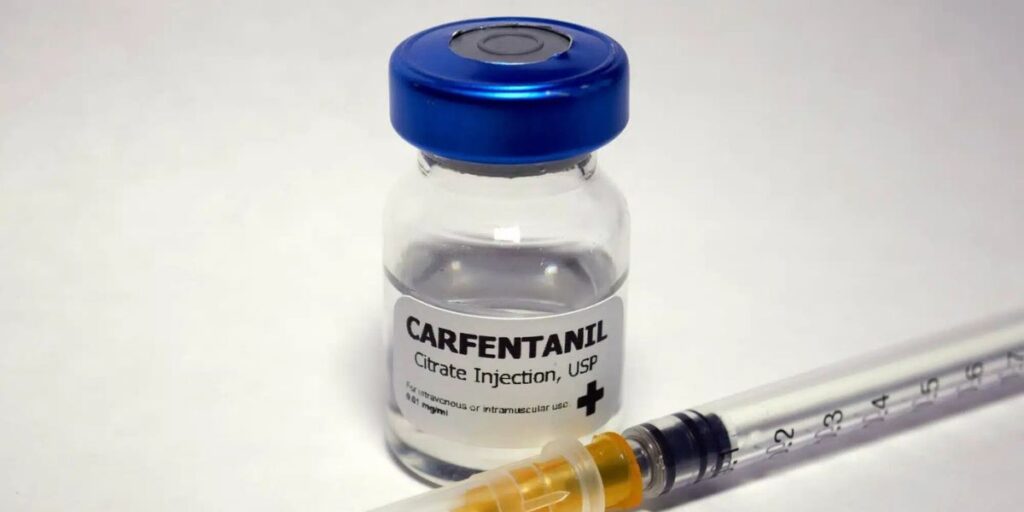Carfentanil: Another Dangerous Opioid like Fentanyl


Carfentanil is exceedingly powerful and fatal upon inhalation or contact. Also, it’s cheap and easy to find on the streets, where it is often falsely sold as heroin. However, carfentanil is 50 times more potent than heroin.
Carfentanil’s arrival in the United States has led to a significant rise in overdose deaths. This is because of its strong intensity and detrimental impacts.
What Is Carfentanil?
Carfentanil is a powerful synthetic opioid. It is classified as a Schedule II drug under the Controlled Substance Act. This is because it is chemically similar to fentanyl. Fentanyl is another synthetic opioid used for pain relief.
According to the Drug Enforcement Administration (DEA), carfentanil’s potency surpasses morphine by 10,000 times and fentanyl by 100 times. The dosage that could lead to death is not definite and can fluctuate based on the mode of drug intake and various other elements.
People use carfentanil as a sedative for large animals, and authorities have never approved its use in humans. A mere 2 milligrams of this substance can tranquilize an elephant of average size. This minuscule quantity is sufficient to cause the death of about 50 people.
Street Names
As carfentanil’s use grows in popularity, it has acquired several street names, including:
- Drop-dead
- Gray death
- Serial killer
- C.50
- Elephant tranquilizer
Being aware of these terms can help prevent accidental interactions with or consumption of this deadly substance.

The Carfentanil High
According to reports from the World Health Organization (WHO), opioid users who think they have used carfentanil instead of heroin describe feeling a “more intense rush, stronger effects, and shorter duration of effects.” Other opioid users said the high was unpleasant, calling it “a mucky, dirty feeling.”
Other reported adverse effects include:
- Facial “reddening” sensation
- Difficulty in breathing
- Vision impairment
- Sensations of skin prickling
People frequently combine carfentanil with other substances. This can make it difficult to determine the source of any negative effects. It may be unclear whether the effects are from the drug itself, the other substances, or a combination of both.
Side Effects
The side effects of carfentanil use include:
- Pupils are constricted
- Breathing is superficial
- Unconscious state
- Feeble pulse
- Skin is cold and sweaty
- Feeling of lightheadedness
Typically, users are unaware that they are consuming carfentanil. Reports indicate that it produces a reduced sense of euphoria compared to morphine or heroin.
Carfentanil Overdose Symptoms
Symptoms of a carfentanil overdose are similar to those of an opioid overdose, which include:
- Sudden bluish tint on the lips
- Rattling noises during respiration
- Rigidity of the body
- Actions resembling seizures
- Frothing at the mouth
- Disorientation
- Lack of responsiveness
Mixing opioids with substances such as heroin, cocaine, alcohol, or benzodiazepines can slow down breathing and the nervous system. This can lead to a deadly overdose.
The Centers for Disease Control and Prevention (CDC) has raised alarm over the increase in fatalities linked to carfentanil in certain states. Out of 11,045 opioid overdose deaths between July 2016 and June 2017, 2,275 cases involved carfentanil. Notably, Ohio documented 400 deaths from July to December 2016.
As the prevalence of this dangerous synthetic opioid rises, recognizing the symptoms of an overdose becomes crucial. If you suspect someone is overdosing, immediately call 911.
Always keep naloxone, also referred to as Narcan, readily available for potential overdose emergencies. Administering naloxone immediately can help counteract the impact of an opioid overdose. It may take several doses to counteract the overdose fully.

Opioid Use Disorder Treatment
Carfentanil use can lead to death, especially if its usage is unknown. If you or someone close to you is dependent on a synthetic opioid, the results can be deadly as well.
At White Oak Recovery Center (WORC), our compassionate team of professionals is here to help you with substance use disorders and co-occurring mental health conditions. Our therapists, counselors, and nurses work together to provide support. They assist in managing the disorder and promoting recovery.
WORC’s residential addiction treatment program teaches people about the risks of carfentanil and how it is often combined with different drugs. This knowledge helps people understand the risks associated with drug abuse and encourages a healthier life in recovery.
Starting the recovery process might feel overwhelming, but help is available. Our treatment specialists are prepared to assist you in identifying the most suitable rehab plan for your requirements. Let us help you on your path to recovery. Contact us today.

Am I covered for addiction treatment?
Your insurance may cover treatment. Call now for an entirely free and confidential assessment. Recovery starts with a phone call.

- Jalal, Hawre, and Burke, Donald S., “Carfentanil and the Rise and Fall of Overdose Deaths in the United States.” Addiction, Sep. 2020.
- “DEA Issues Carfentanil Warning to Police and Public.” Drug Enforcement Administration, Sep. 2016.
- “The Overdose Crisis: Interagency Proposal to Combat Illicit Fentanyl-Related Substances.” National Institute on Drug Abuse, Dec. 2021.
- “Provisional Drug Overdose Death Counts.” National Center for Health Statistics, Mar. 2024.
Medical Disclaimer:







